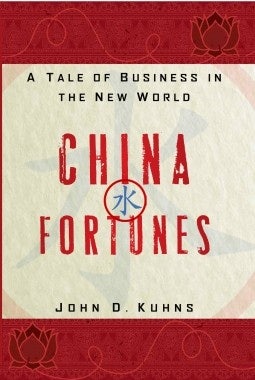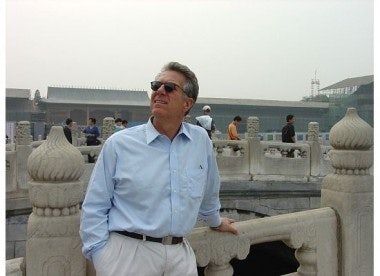John D. Kuhns Spins A Tale Of Gambling It All On China#

John D. Kuhns, the first American to acquire commercial hyrdro-electric generating equipment from China, and one of the first western businessmen to do business there after the economic reforms of the late 1970s, draws on his experience in the novel China Fortunes: A Tale of Business in the New World (Wiley, hardback, 2011). The fictional tale follows Jack Davis, a character modeled very much after Kuhns himself, as he begins to conduct business and chase potential wealth in 1980s China, delving into many of the issues that awaited foreigners in the early days of China's "reform and opening-up" period.
Eschewing the traditional format of the often self-aggrandizing, increasingly tiresome "pioneering businessman" or "how to make it in China" genres, China Fortunes vividly illustrates the opportunities and obstacles experienced by foreign businesspeople in the early days of China's sometimes uncomfortable embrace of capitalism. Reading much like other recent China books such as Lawrence Allen's business memoir Chocolate Fortunes or Lisa Brackmann's novel Rock Paper Tiger, China Fortunes manages to tread the fine line between entertainment and education, never losing sight of the adventure and mind-expanding aspects of living and working in China as a foreigner.
Jing Daily exchanged a short Q&A with the author, John Kuhns, about the book and his experience of doing business in China.
Jing Daily (JD): What would be [your main character] Jack’s hard rules for doing business in China?#
John D. Kuhns (JK)
: Jack’s first hard rule for doing business anywhere is to keep things simple. That means doing the same thing he did when he was making money before, and changing only one element (the thing that, in his previous business, he could not continue; of course, we’d all rather just keep doing the same thing forever as long as it is successful, but life has a way of preventing that). For example, in China Fortunes, Jack Davis was comfortable developing hydroelectric projects Stateside, so when the big power companies eliminated that option in America, he made one change—location—and simply went to China to keep doing it. He didn’t go to China to develop wind farms (which would not have been too far afield), let alone invest in computer software or traditional Chinese medicine.
And as far as simplicity, China provides a very predictive pattern for international investors. Because China’s economic development, while gargantuan, still lags behind other older economies, industrial patterns observed elsewhere should often duplicate themselves in the PRC. So for example, I have a good idea what is going to happen to the auto parts industry in China—namely, that the industry will thrive until such time as each household has at least one vehicle (which is decades away), because the same thing happened to the auto parts industry in America and other western countries. So I would invest in auto parts in China, but would avoid investing in China’s software or medicine industries, where the trends between China and other economies are not as predictable. And I think Jack would agree.
JD: You’ve been in and out of China for what is considered a very long time for Western businessmen - as has the character Jack. What would you describe as the most important changes in the business environment?#
JK:
There have been several important changes in China’s business environment since I came to China in 1984. In my opinion, especially for foreign investors like me, liberalizing the structural ownership and investment rules has been one of the most important forces behind the river of foreign money flowing into the country that has been essential for China’s industrialization. For example, when I first came to China, foreigners were not allowed to own any part of a power project in China. But the PRC needed huge amounts of new electric generating capacity, so in the early 1990’s, the rules were changed so foreigners could participate—on a minority ownership basis—in Sino/Foreign joint ventures to own power projects.
In turn, as Jack Davis learned with his partners on the Minjiang, the joint venture structure could be unsatisfactory, as it prevents each side from seeing what the other is doing. So because China still needs more and more power, in 2002 the authorities further deregulated the electric sector, so since that time investors can own a power project through a structure called a “WOFE” (a wholly-owned-foreign-enterprise), a much more transparent vehicle.
Other factors would include the following: a) emergence of an extremely vibrant and viable banking market—it’s incredibly easy to get a loan in China; b) development of a large, well-educated, English-speaking workforce; c) development of world-class infrastructure elements—things we all take for granted today, but were simply not there twenty years ago—like roads, power lines, airports and trains.
The culmination of many factors in China’s business environment—some induced by the government, some I believe simply bubbling up from China’s people themselves—is that today, making money is generally seen to be an exalted activity in China. Definitely not the way things were in 1984.

JD: You often use the term “Fake China” to describe China’s first-tier cities in that they don’t reflect the majority of China, which is predominantly rural. But with China rapidly globalizing, is your concept of “Fake China” changing?#
JK
: Yes, it is, but I hope it doesn’t change too much! Seriously, I think it will be a while before many other large Chinese cities approach the same size and sophistication as Beijing and Shanghai, which to some observers are threatening, to appear too similar to any other highly urbane world center. But the headlong “progress” I’ve observed in some large Chinese cities may be too rapid for its own good; they may wipe away some of their city’s unique elements that may indeed be falling down or shoddy, but still are redolent of the country’s culture, and should be preserved. And I’ve seen other, larger Chinese cities that have managed to avoid that. Hangzhou comes to mind; it’s easy to spend $400 on a room at the Hyatt on West Lake in Hangzhou (so in that sense, it’s “fake”), but the environment surrounding the lake remains uniquely Chinese—and spectacular!
JD: Despite early failures, why was Jack continuously drawn to China?#
JK
: In Jack’s world, there was simply nothing like China. The world’s oldest and most formidable culture, engaged in the largest economic expansion in history: who wouldn’t be drawn to that? And that was before he met [the character] Lianhua!
JD: The book ends somewhat open-ended. Do you see Jack continuing to do business in China and does he face the challenges?#
JK
: The people Jack befriended in China that he cares most about—people like Lianhua, the vision he was seeking to reunite with in the Himalayan foothills, and Dr. Yu, his partner who stayed with him on Christmas in Jiamusi—are people he will choose to be with the rest of his life. And that means China will be part of Jack, and he of it, for the rest of his life as well.